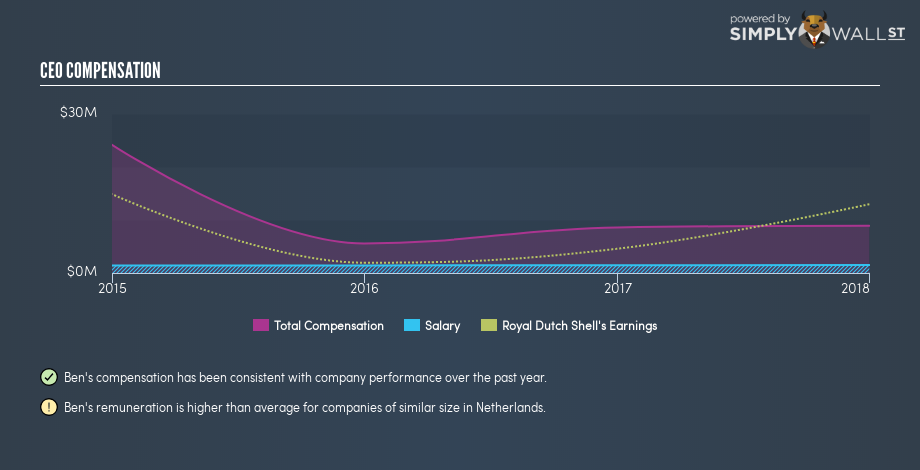What Did Royal Dutch Shell plc’s (AMS:RDSA) CEO Take Home Last Year?

Ben van Beurden has been the CEO of Royal Dutch Shell plc (AMS:RDSA) since 2014. First, this article will compare CEO compensation with compensation at other large companies. Next, we’ll consider growth that the business demonstrates. And finally we will reflect on how common stockholders have fared in the last few years, as a secondary measure of performance. This process should give us an idea about how appropriately the CEO is paid.
View our latest analysis for Royal Dutch Shell
Want to help shape the future of investing tools and platforms? Take the survey and be part of one of the most advanced studies of stock market investors to date.
How Does Ben van Beurden’s Compensation Compare With Similar Sized Companies?
According to our data, Royal Dutch Shell plc has a market capitalization of €217b, and pays its CEO total annual compensation worth US$8.9m. (This number is for the twelve months until 2017). While this analysis focuses on total compensation, it’s worth noting the salary is lower, valued at US$1.5m. When we examined a group of companies with market caps over €7.0b, we found that their median CEO compensation was €3.6m. Once you start looking at very large companies, you need to take a broader range, because there simply aren’t that many of them.
As you can see, Ben van Beurden is paid more than the median CEO pay at large companies, in the same market. However, this does not necessarily mean Royal Dutch Shell plc is paying too much. A closer look at the performance of the underlying business will give us a better idea about whether the pay is particularly generous.
You can see a visual representation of the CEO compensation at Royal Dutch Shell, below.
Is Royal Dutch Shell plc Growing?
Royal Dutch Shell plc has increased its earnings per share (EPS) by an average of 84% a year, over the last three years (using a line of best fit). It achieved revenue growth of 31% over the last year.
Overall this is a positive result for shareholders, showing that the company has improved in recent years. Most shareholders would be pleased to see strong revenue growth combined with EPS growth. This combo suggests a fast growing business.
It could be important to check this free visual depiction of what analysts expect for the future.
Has Royal Dutch Shell plc Been A Good Investment?
Boasting a total shareholder return of 83% over three years, Royal Dutch Shell plc has done well by shareholders. So they may not be at all concerned if the CEO were to be paid more than is normal for companies around the same size.
In Summary…
We compared total CEO remuneration at Royal Dutch Shell plc with the amount paid at other large companies. We found that it pays well over the median amount paid in the benchmark group.
Importantly, though, the company has impressed with its earnings per share growth, over three years. In addition, shareholders have done well over the same time period. So, considering this good performance, the CEO compensation may be quite appropriate. CEO compensation is one thing, but it is also interesting to check if the CEO is buying or selling Royal Dutch Shell (free visualization of insider trades).
Or you might prefer this data-rich interactive visualization of historic revenue and earnings.
To help readers see past the short term volatility of the financial market, we aim to bring you a long-term focused research analysis purely driven by fundamental data. Note that our analysis does not factor in the latest price-sensitive company announcements.
The author is an independent contributor and at the time of publication had no position in the stocks mentioned. For errors that warrant correction please contact the editor at editorial-team@simplywallst.com.


